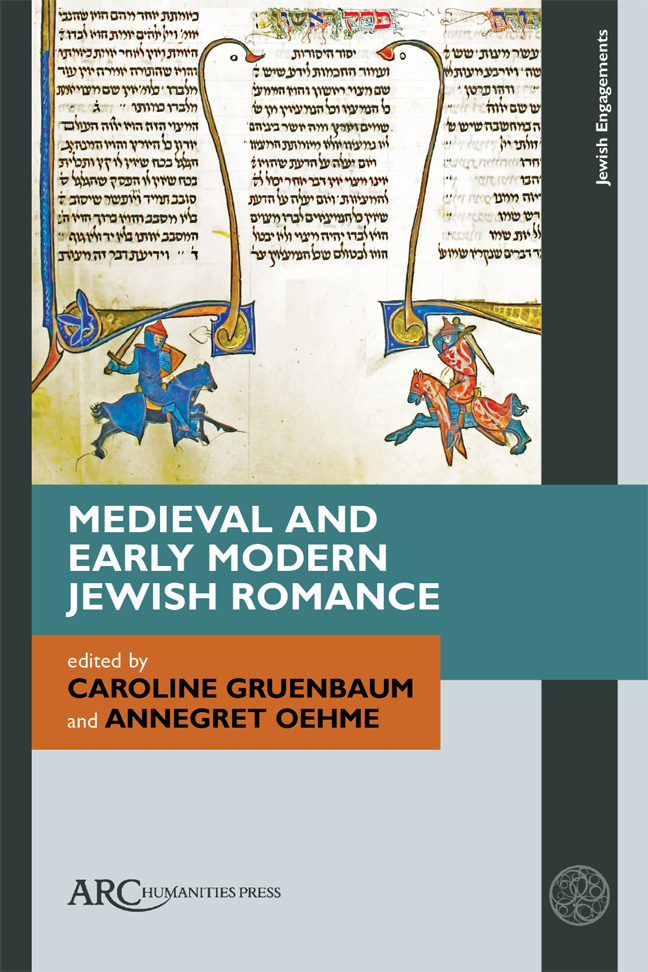Book contents
- Frontmatter
- Dedication
- Contents
- List of Illustrations
- Acknowledgements
- Introduction
- The Zohar as Medieval Jewish Romance
- Letters of Loathing: Immanuel of Rome and Romance Epistolary
- Illuminated Knights and Tales of Romance in the Rothschild Miscellany
- The Queen Nudatio: A Romanesque (?) Topos in Israel Caslari's Roman d’Esther
- At the Court of the Demon King: The Story of the Jerusalemite and Chivalric Romance
- Melekh Artus as a Jewish Romance: Horizons of Expectation and Genre Configurations
- A Friend in Need is a Friend Indeed?Friendship, Love, and Loyalty in the Yiddish Seven Sages of Rome
- Stealing Back One's Husband: The Yiddish Mayse mi-Danzek in the Context of Early Modern German Cross-Dressing Narratives
- Romance Elements in Meshal Haqadmoni by Isaac Ibn Sahula: A New Reading
- Afterword: Jewish Romance in Search of Identity
- Select Bibliography
- Index
Letters of Loathing: Immanuel of Rome and Romance Epistolary
Published online by Cambridge University Press: 18 February 2024
- Frontmatter
- Dedication
- Contents
- List of Illustrations
- Acknowledgements
- Introduction
- The Zohar as Medieval Jewish Romance
- Letters of Loathing: Immanuel of Rome and Romance Epistolary
- Illuminated Knights and Tales of Romance in the Rothschild Miscellany
- The Queen Nudatio: A Romanesque (?) Topos in Israel Caslari's Roman d’Esther
- At the Court of the Demon King: The Story of the Jerusalemite and Chivalric Romance
- Melekh Artus as a Jewish Romance: Horizons of Expectation and Genre Configurations
- A Friend in Need is a Friend Indeed?Friendship, Love, and Loyalty in the Yiddish Seven Sages of Rome
- Stealing Back One's Husband: The Yiddish Mayse mi-Danzek in the Context of Early Modern German Cross-Dressing Narratives
- Romance Elements in Meshal Haqadmoni by Isaac Ibn Sahula: A New Reading
- Afterword: Jewish Romance in Search of Identity
- Select Bibliography
- Index
Summary
The goblet is clear, as is the wine.
Beholding both is weary for the eye.
Can wine with no vessel stand alone?
Or is it just a vessel with no wine?
THIS EPIGRAM, SEEMINGLY an innocuous wine poem, concludes a disparaging letter written by the medieval poet, Immanuel of Rome, to a certain Rabbi Hillel. The letter accuses its addressee of challenging an established and revered scholar while relying too heavily on foreign wisdom. Although the letter is filled with criticism, its charges are vague and opaque, with the concluding epithet as the nastiest part of this letter. Immanuel deploys the Hebrew technique of hafla’ah or mock wonderment—a technique where a poet poses a fantastical and impossible situation to heighten the effect of the compared objects—to suggest that while the addressee looks like a scholar, he is no more than an empty vessel. This letter is the only diplomatic text attributed to Immanuel of Rome (active in the fourteenth century), the Italian Jewish author of the poetic anthology, Maḥberot Immanuel, whose lifetime coincided with a major shift in the Christian practices of letter-writing and composition in Italy.
Immanuel of Rome's prolific writings offer a window into the literary and cultural history of medieval Jews in the Italian peninsula. A textual omnivore deeply embedded in the contemporary philosophical and literary discourse of his day, Immanuel curates current ideas and texts from the non-Jewish world and integrates them into his own reflections on biblical exegesis, language, or the human condition. The myriad forms, tropes, and themes in his poetic anthology, Maḥberot Immanuel, attest to his compositional creativity, especially as Immanuel is credited as being one of the earliest transmitters of the sonnet form from Italian into Hebrew. Using Immanuel's invective letter to Hillel together with letters embedded in the literary Maḥberot Immanuel, this chapter explores the possibility that Immanuel of Rome was familiar with emerging humanistic letter-writing conventions developing in late medieval Italy to address a question in the literature about whether the Latin conventional manuals of letter writing, known as artes dictaminis, were influential on Jewish authors.
With its focus on oratory—public speeches to be delivered in the Senate—classical rhetorical theory was only somewhat useful to medievals, who communicated almost solely through written letters.
- Type
- Chapter
- Information
- Medieval and Early Modern Jewish Romance , pp. 35 - 48Publisher: Amsterdam University PressPrint publication year: 2023

